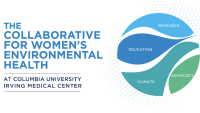Our Work

The Collaborative for Women’s Environmental Health (CWEH) supports the environmental health of women, their families and their communities with work across four key areas:
Research
CWEH uses research to better understand how environmental exposures and climate change impact women’s and reproductive health. Active areas of focus include:
- Heat
- Air pollution
- Pesticides and herbicides
- Lead
- Endocrine disrupting chemicals
Selected Publications
Coming soon...
Education
CWEH aims to serve as a helpful resource for both patients and providers by sharing information about various environmental exposures and concerns.
Fact Sheets
The collaborative has developed a number of peer-reviewed fact sheets for communicating the impact of selected environmental exposures on key women's health outcomes.
- Air quality and pregnancy / La Calidad del Aire y el Embarazo
- Consumer products and pregnancy: a focus on parabens / Productos de Consumo Diario y el Embarazo: Enfoque en los parabenos
- E-cigarettes and pregnancy
- Heat and pregancy / El Calor y el Embarazo
- Household Energy Resources / Recursos de Energía para el Hogar
- Lead and pregnancy
- Marijuana (THC) and pregnancy
- Mercury and pregnancy
- Plastics and pregnancy: a focus on bisphenols / Los Plásticos y el Embarazo: Enfoque en los bisfenoles
- Plastics and pregnancy: a focus on phthalates / Los Plásticos y el Embarazo: Enfoque en los ftalatos
- Toxic chemicals and pregnancy: a focus on perfluorinated alkyl substances / Químicos Tóxicos y el Embarazo: Enfoque en las sustancias perfluoroalquiladas (PFAS)
- What Ob/Gyns should know about climate change
Presentations
Coming soon...
Sample Environmental Health History Questionnaires
Coming soon...
Additional Educational Materials
-
ACOG Committee Opinion on Prenatal Exposure to Toxic Environmental Agents
-
Columbia Center for Children's Environmental Health Fact Sheets
-
UCSF Program on Reproductive Health and the Environment Brochures
-
March of Dimes Air Pollution and Maternal Newborn Health Inequities
-
March of Dimes Toxicants in Cosmetics and Maternal Newborn Health Inequities
-
March of Dimes Disasters and Maternal Newborn Health Inequities
-
March of Dimes Extreme Heat and Maternal Newborn Health Inequities
Advocacy & Community Engagement
CWEH engages in environmental health advocacy work, which includes partnering with community-based organizations to advocate for safer environments, advising governmental leaders on policy, and building networks between local environmental justice organizations and global women's health initiatives.
- Postpartum doula and community health worker program: A collaboration between the Department of Ob/Gyn and Northern Manhattan Perinatal Partnership, CWEH will educate doulas and community health workers around key environmental health issues, equipping them with the tools to share resources and information with families during home visits.
- Environmental justice: Members of the collaborative are actively engaged in the following environmental justice initiatives:
Sustainability & Climate Change
CWEH is committed to promoting sustainability and climate resilience, both of which are central to the collaborative's research, education, and advocacy efforts.
- Columbia University GME Certificate of Distinction in Climate Change, Sustainability, and Health
-
Dr. Blair Wylie of The Collaborative was a drafting author of the WHO's Call to Action on Protecting maternal, newborn and child health from the impacts of climate change
- Climate Emergency Preparedness Workshop for Maternal-Newborn Health Providers
- Seminars in perinatology: Impact of climate change on obstetric and neonatal health, December 2023
- Sustainability Initiatives in Department of Ob/Gyn:
- Red Bag Initiative - Launched on Earth Day in 2022, CWEH performed an audit of waste bin locations on the Labor and Delivery floor of Columbia University Irving Medical Center. This audit generated recommendations which resulted in an increase in the ratio of regular to red bag waste and a strategic re-location of waste bins to encourage appropriate waste disposal.